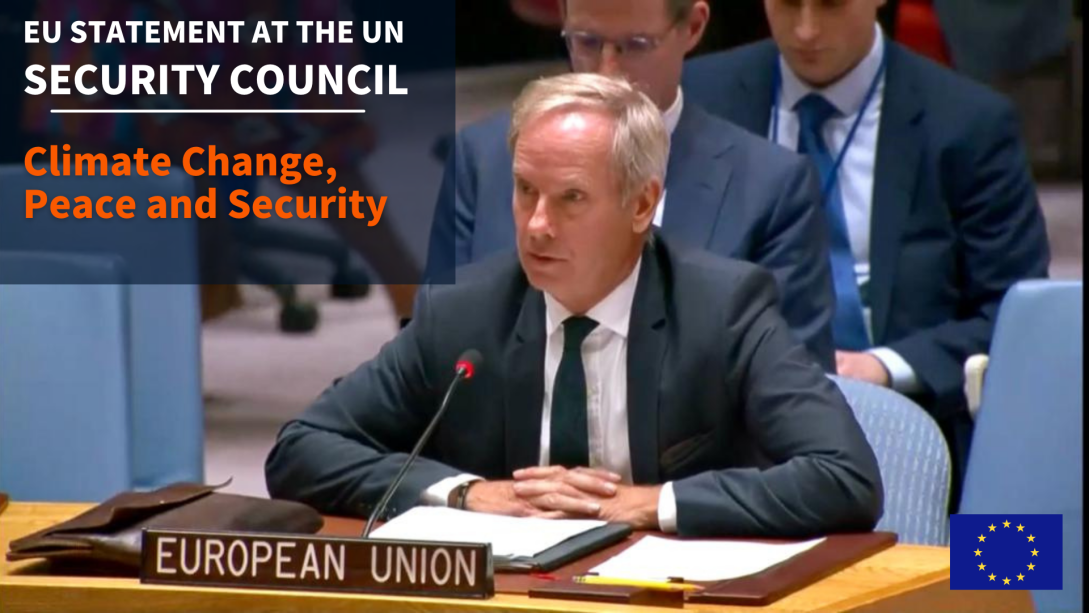EU Statement – UN Security Council: Ministerial Debate on Climate Change, Peace and Security

Minister, colleagues,
I have the honour to speak on behalf of the EU and its Member States.
The Candidate Countries North Macedonia, Montenegro, Albania, Ukraine, the Republic of Moldova, and the potential candidate country Georgia align themselves with this statement.
The correlation between climate change, peace and security is evident. It will grow stronger over the next years and decades, as the global climate crisis unfolds. The most vulnerable populations will suffer most, even though they have hardly contributed to the cause, including women and girls who are particularly affected by climate change in fragile settings. We are all in this together, and have to do more to slow this ongoing catastrophe.
I will not go in details on the multiple connections between the climate crisis, environmental degradation and conflict here. They have been discussed in seven thematic debates in the Security Council in the last two years alone. It is clear that there is broad support, including from the EU and its Member States, for the Security Council to work on climate-related security risks in a more systematic way.
We are still a long way from the target we set ourselves in 2009 in General Assembly Resolution 281, which invited the relevant organs of the UN to intensify their efforts in addressing climate change, including its possible security implications.
Whilst vetoed, the co-sponsorship by 113 countries for the thematic UNSC Resolution of December 2021 on security implications caused by climate change was a clear indication of broad support for action among the membership.
Affected countries and populations are at the forefront of this request, and we should all listen closely to what they have to say: The climate crisis leading to water scarcity, food insecurity, and environmental degradation will drive conflicts for decades to come and the Security Council needs to step up and assume its responsibility.
We support the proposals put forward by some Members of the Security Council during this debate, in particular:
- encouraging UN Special Representatives to provide the Council with precise climate-related information during their briefings, and also to present recommendations for targeted action on the impact of climate crises in their regions.
- strengthening the mandates of all UN Missions, so that they can support the most vulnerable countries in climate-related risk assessment and management
- continuing to support the work of the UN on the ground. The Climate, Peace and Security Advisors deployed to UN Missions play a particularly useful role. We call on Member States to join the collective effort by engaging with the UN Climate, Peace and Security Mechanism, which aims to help integrate the impact of climate change when addressing peace and security issues
We support the position of the Group of Friends on Climate and Security in favour of consideration of a regular report by the Secretary-General and for a dedicated UN envoy for climate and security. I also want to express our appreciation for the important role played by the Climate Security Mechanism and the Informal Expert Group of members of the Security Council.
Building on the broad support for this topic, the UN and Member States have been integrating climate as one central aspect into the mandates of UN missions such as UNSOM, UNMISS and UNAMI.
The EU and its Member States support the UN in this vital endeavour. Climate and environment are an integral part of the EU-UN Strategic Partnership Priorities for Peace Operations and Crisis Management in 2022-2024. 13 out of 22 current EU civilian and military missions and operations are deployed in parallel with UN missions, e.g. in Mali, the Central African Republic, Somalia, Libya and Iraq. The EU’s progressive deployment of environmental advisors to all its missions and operations will enable joint EU-UN local capacity building efforts, data sharing and management of the environmental footprint. We look forward to working together closely with the UN in this field.
Furthermore, let us not forget that armed forces also have to contribute to global target of net-zero by mid-century, by bringing down their own emissions and becoming more energy and resource efficient. We call on the UN to continue making progress in reducing the environmental footprint of its missions, following up on the the Environment Strategy for Field Missions, and to exchange good practices with UN Member States.
Tackling the manifold peace and security impacts of climate change and environmental degradation effectively requires context specific solutions. One example is the EU-UNEP Partnership on Climate, Environment, and Security that has developed tools and capacities to enhance environment and climate-security analysis and preventive action to address conflict and fragility risks in two pilot countries, Nepal and Sudan. Moving from its pilot phase to scaling up at the regional level, the partnership will now address emerging climate and environment-related risks in the Horn of Africa, the Middle East and North Africa (MENA), West Africa and the Sahel.
The EU will further step up its engagement. We will soon adopt a Joint Communication on a new outlook on the climate and security nexus, which will address the impacts of climate change and environmental degradation on peace, security and defence in a comprehensive manner. Strong partnerships are needed. We welcome and encourage increased joint work between the EU, UN system, OSCE and NATO. We will continue to exchange at the UN on how we can jointly make progress in addressing climate related security risks.
We look forward, Mrs Minister, to an ambitious COP28 in UAE, which moves us forward on the energy transition and which keeps 1.5 Celsius alive.
I thank you.
